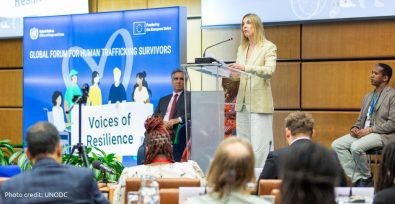When we build systems to combat trafficking without survivor input, we risk repeating the very power dynamics that allowed exploitation to happen in the first place. That’s why the United Nations Office on Drugs and Crime (UNODC), supported by the European Union, hosted its first-ever Global Forum for Human Trafficking Survivors in Vienna last month.
Titled Voices of Resilience, the June 24–25 gathering brought over 35 survivor leaders together with governments, service providers, and civil society organizations to shift the global anti-trafficking agenda. The message was clear: survivors must not only be heard—they must lead.
Survivors are more than just their stories
At the heart of the forum was a shift in mindset: survivors are not only witnesses to injustice, but experts in preventing it. They understand how trafficking works from the inside out and their knowledge is indispensable in designing meaningful solutions. This sentiment was echoed by Frey A Worku, a survivor from Ethiopia who said:
“Survivors have often been left out of the very systems meant to address human trafficking, … This has to change.”
Participants emphasized that escaping trafficking is only the beginning. Survivors often face long-term trauma, inadequate justice systems, and recovery services that fail to meet their needs. They also carry the kind of insight that can shift societal awareness. Laurent Ziegler, another trafficking survivor emphasized this point by saying:
“Trafficking can’t be addressed without the involvement of everyone, without society as a whole,”
Additionally, Diane Schmitt, the EU Anti-Trafficking Coordinator, highlighted the reality that many trafficking victims remain invisible. Survivors’ voices are vital not only for designing better support systems, but for helping society recognize trafficking in the first place. Their insight helps shift awareness, challenge misconceptions, and bring hidden exploitation to light.
The call to action
The forum closed with a comprehensive Call to Action, urging governments to ground their anti-trafficking efforts in nine key principles informed by survivors’ lived experience. Among them was an action to tailor protection measures to the needs of children. Children who experience trafficking face unique vulnerabilities. The Call to Action urges governments to provide specialized, age-appropriate care and to extend support into adulthood. Too often, support is cut off when children turn 18—a transition that can leave them vulnerable once again. Survivors emphasized that protection systems must adapt to their realities.
Another important call to action was to Provide Sustained Support for Recovery and Independence. The Call to Action emphasizes the need for long-term holistic care that includes safe housing, healthcare, education, and financial support to prevent re-victimization.
This principle resonates strongly with recent concerns raised in the UK, where many trafficking survivors face a grueling 10-year route to permanent residency. Survivors often face prolonged uncertainty as costly, complex visa renewals drain their finances and take a toll on their mental health. Rather than fostering stability, this system risks re-traumatizing the very people it should protect.
“The Call to Action is more than a declaration,” said Ilias Chatzis, Chief of the Human Trafficking and Migrant Smuggling Section at UNODC. “It is a roadmap and a promise to make protection central, not secondary; to turn voices into action; and to build systems grounded in survivors’ realities.”
Dignity is non-negotiable
Trauma does not define a survivor. They are leaders, advocates, and change-makers. At Freedom United, we make sure survivor stories are represented with care.
Through our My Story, My Dignity pledge, we commit to telling stories that are respectful, accurate, and dignified. We include survivors in decisions about how their stories are shared—never speaking for them, but with them.
Join us in changing the narrative. Take the pledge here.







Freedom United is interested in hearing from our community and welcomes relevant, informed comments, advice, and insights that advance the conversation around our campaigns and advocacy. We value inclusivity and respect within our community. To be approved, your comments should be civil.
Wherever possible, survivors of human trafficking need to be a part of the organisations that work to prevent human trafficking or rescue people from trafficking. They have the lived experience.